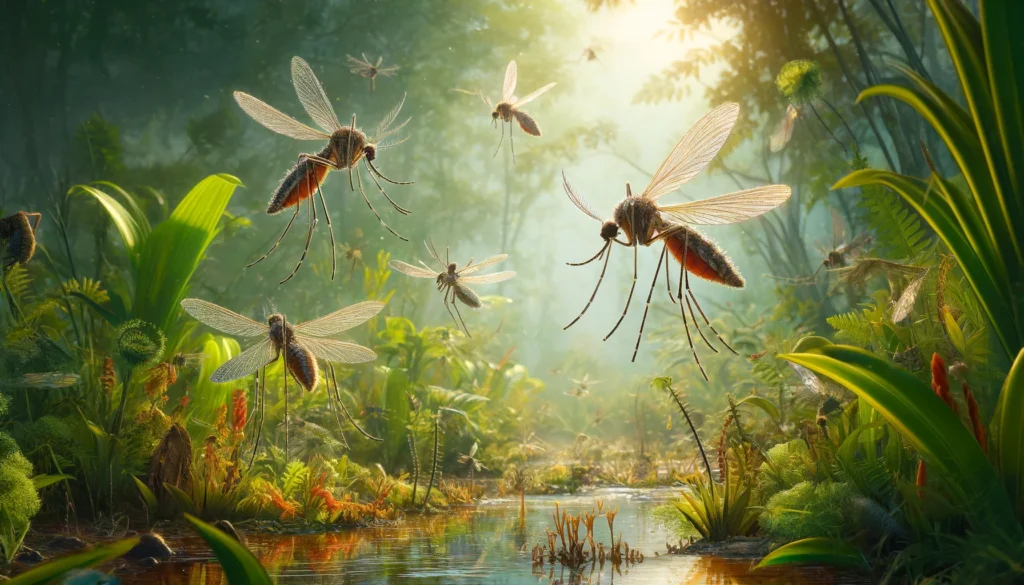When you think of mosquitoes, your first instinct might be to reach for the bug spray. But what if I told you that these buzzing nuisances have their upsides too? Yes, you heard that right! Despite their notorious reputation for leaving itchy bites and transmitting diseases, mosquitoes play several crucial roles in our ecosystem and beyond. Aristotle once pondered the essence of life’s interconnectedness, hinting that every creature has its place and purpose. So, before you swat away the next mosquito that comes buzzing, let’s explore some of the unexpected benefits these tiny insects offer to the world.

- 10 Benefits of Mosquitoes
- Pollinators in Disguise
- A Vital Link in the Food Web
- Biodiversity Boosters
- Population Control
- Medical Research and Advances
- Environmental Indicators
- Stimulate Economies
- Soil Enrichment
- Inspiration for Technology
- Survival Training
- Summary: A New Perspective on an Old Nemesis
- FAQ (Frequently Asked Questions About Mosquitoes)
- Can we live without mosquitoes?
- Why do mosquitoes bite me and not my husband?
- What eats most mosquitoes?
- Which blood type do mosquitoes hate?
- How can I be less attractive to mosquitoes?
10 Benefits of Mosquitoes
Pollinators in Disguise
While they’re infamous for feeding on blood, most mosquitoes actually consume nectar for their primary source of energy. In their quest for nectar, they pollinate many plants, aiding in the reproduction of various species, much like bees or butterflies.
A Vital Link in the Food Web
Mosquitoes serve as a crucial food source for a wide range of species. Birds, bats, spiders, and fish are just a few of the creatures that feast on these insects. Their role is pivotal in maintaining the balance of the ecosystems they inhabit.
Biodiversity Boosters
By being a food source for numerous predators, mosquitoes help sustain population balances in different habitats. This promotes biodiversity, ensuring healthy ecosystems where life can flourish in balance.
Population Control
It might sound counterintuitive, but mosquitoes help control the population of other species, including humans. By transmitting diseases, they can influence population dynamics, which, while harsh, is a natural ecological control mechanism.
Medical Research and Advances
Mosquitoes are central to many studies in medicine, particularly in the development of vaccines and other strategies for combating the very diseases they spread. Understanding how these diseases are transmitted has led to significant medical breakthroughs and advancements.
Environmental Indicators
Mosquito populations are sensitive to temperature and climate changes, making them excellent indicators of environmental health. Researchers can study changes in mosquito activity to monitor the effects of climate change and habitat destruction.
Stimulate Economies
This might be a stretch, but mosquito control efforts contribute to local economies. The need for mosquito repellent products, research funding, and pest control creates jobs and drives innovations in chemical and natural repellents.
Soil Enrichment
When mosquitoes die, their bodies become part of the organic matter in soil, which decomposes and enriches the soil, helping to support robust plant growth.
Inspiration for Technology
Mosquitoes have inspired advancements in technology. For example, their ability to fly in the rain has led to research into improving the performance of drones under similar conditions. Their proboscis has inspired new needle designs for less painful injections.
Survival Training
Mosquitoes challenge humans to develop better survival skills. Whether it’s inventing more effective repellents or designing clothing and shelters to keep them at bay, these pests push us to innovate.
Summary: A New Perspective on an Old Nemesis
While it’s easy to view mosquitoes as mere pests, understanding their role in the ecosystem and their contributions provides a broader perspective on their place in the natural order. Just as Socrates suggested that every creature has its purpose, mosquitoes, too, contribute to the complexity and balance of our ecosystems. So next time a mosquito buzzes by, perhaps consider it a reminder of nature’s intricate web of life – just before you reach for the repellent!
FAQ (Frequently Asked Questions About Mosquitoes)
Can we live without mosquitoes?
Technically, yes, we could live without mosquitoes, but the ecological fallout might make us wish we hadn’t swatted away these pesky insects. Mosquitoes play a crucial role in the food web, serving as food for birds, bats, and fish. They are also pollinators for certain plants. Removing them could cause significant disruptions. So, while they’re a nuisance at your barbecue, they’re a feast elsewhere in nature.
Why do mosquitoes bite me and not my husband?
Mosquitoes don’t play favorites – they play the scent game. These bloodsuckers are attracted to certain chemicals on the skin, like carbon dioxide, body heat, and sweat. Your unique body chemistry might just be more appealing to mosquitoes than your husband’s. It’s like being the favorite dish at the insect buffet. Consider it a dubious honor!
What eats most mosquitoes?
Bats are the night-time heroes when it comes to chowing down on mosquitoes, capable of eating thousands in a single night! During the day, birds such as swallows and waterfowl take over. In aquatic environments, fish like goldfish, guppies, and bass devour mosquito larvae. It’s a full buffet service across multiple ecosystems, keeping mosquito populations in check.
Which blood type do mosquitoes hate?
Research suggests that mosquitoes show a particular fondness for type O blood, so by contrast, they seem less enthusiastic about type A blood. If you’re type A, consider yourself a bit luckier in the mosquito lottery. However, blood type is just one factor; your breath, sweat, and choice of clothing also play significant roles in your allure to these insects.
How can I be less attractive to mosquitoes?
To make yourself less attractive to mosquitoes, start by reducing your scent profile. Avoid perfumes or scented lotions that can draw them in. Wearing light-colored clothing can help, as mosquitoes are more attracted to dark colors. Also, using insect repellent with DEET, picaridin, or lemon eucalyptus oil can effectively keep these pests at bay. Managing your environment, like eliminating standing water where mosquitoes breed, will also reduce your chances of being bitten.







